In this 2016 State of Conversion Optimization Report, we gave a 48 question survey to 722 people who work in the optimization space.
Of course, a lot of what we learned was expected. For instance, many optimizers have little to no budget (sadly).
But we also learned some surprising things, like how many companies are still operating without a structured process, and how little experience many optimizers have.
Without further ado, here are our findings from the 2016 State of Conversion Optimization Report.
What Does an Optimizer Look Like? (Demographics)
Here are some demographics from our survey, just to give you perspective on some of the insights we gained.
58% work in-house, meaning they work on their own employer’s site. 39% work for an agency or do freelancing.
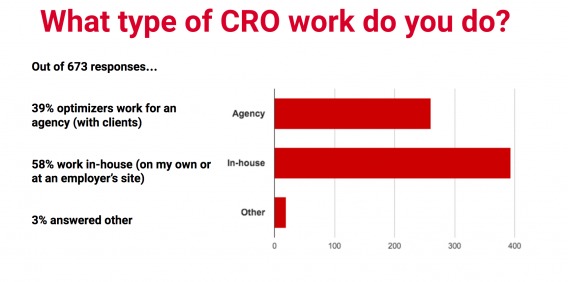
In addition, most of those who work in-house optimize for eCommerce sites (33.9% of total respondents). In-house optimizers at SaaS companies only clocked in at 13.8% of our respondents.
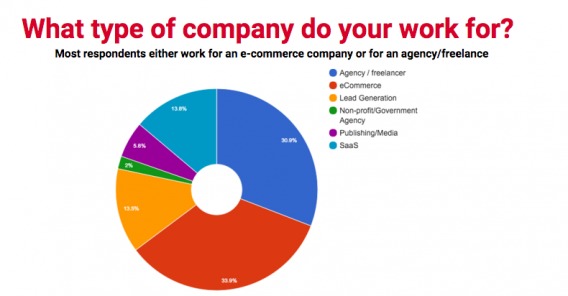
The average salary of conversion optimizers was $71,340. [Tweet it!]
Those in the US had the highest average salary ($87,926). The following four countries had the most respondents:
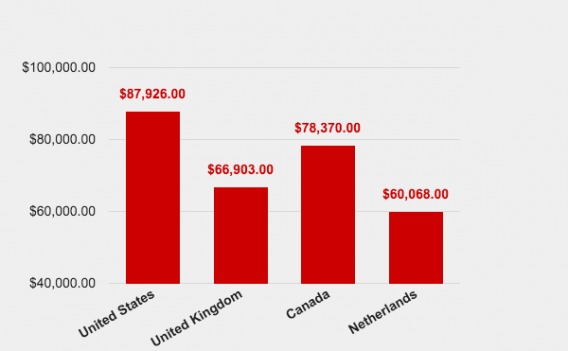
There was also a difference in salary based on company size. The average salary of optimizers in companies with less than 500 employees was $69,469/year, while those in larger companies (500+) make an average of $78,120/year.
It’s Still a Very Young Industry
When you meet a stranger in a bar or coffee shop and start talking about what you do, how many people actually know what “conversion optimization” is?
It’s a young industry, and there are still a lot of misconceptions around it. Still, it’s growing steadily…
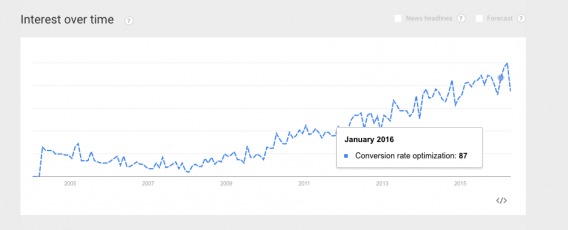
While it’s exciting being a part of a nascent industry, there are some problems that arise from that as well. Notably:
- Lack of optimization knowledge (and don’t know where to learn)
- Lack of experience
Lack of CRO Knowledge
Where do you learn about CRO? Many courses are incomplete or outdated. Also, you need to know a lot of things really well to be good at optimization:
- Analytics
- Qualitative Research
- Statistics
- Technical Skills
- Heuristic Frameworks
- Copywriting
- User Experience
- Psychology
- And more
Of course, you can have a team with specialists for each role, but if you’ve got one person owning the process, they need to know a little bit about each of these (at least enough to QA others’ work).
But still, it’s tough to find a good place to really learn analytics, not to mention all the other things. So where do people go? Mainly, blogs.

We’re happy to note that CXL in particular came up quite often.
Lack of Conversion Optimization Experience
In a young industry, it’s expected that not many people have a lot of experience. But according to our survey, 20% of optimizers have been working in the industry for less than one year. 50% have been working in optimization for less than 3 years. [Tweet it!]
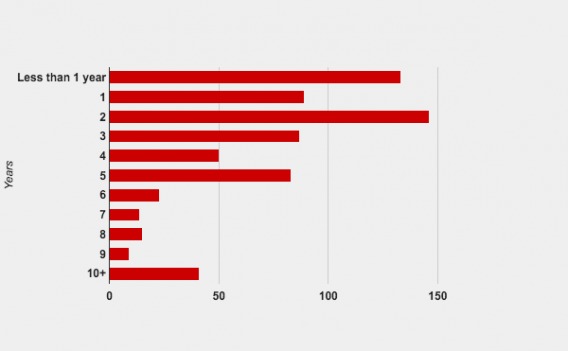
Some of these people may have been working in a fundamental role of CRO previously (UX or analytics), but few have been working specifically in CRO for very long.
What Do You Call an Optimizer?
When we have casual conversations about the conversion optimization space (while A/B testing adult beverages of course), it’s hard for us to come up with a close estimate as to the size of the industry. Why? People go by different job titles. Here are some titles that our respondents go by:
- Analyst
- Conversion Optimizer
- Conversion Specialist/Consultant/Strategist
- CRO Specialist
- Director of Optimization
- Director of Marketing
- eCommerce Manager
- Digital Marketing Analyst
- Growth Hacker / Head of Growth
- Marketing Manager
- Online Marketing Specialist
- Optimization Specialist
- UX Analyst
- Product Manager
- Web Analyst
And there are so many more. See, even if one person ‘owns’ optimization at their company, they still might operate under a different title than you’re used to. And some, say a Director of Marketing, will own optimization efforts, but will also be tasked with other acquisition, retention, etc tasks.
Optimizers go by many names, but they’re all focused on data-driven growth.
Many Companies Still Don’t Have a Structured Optimization Process
Another testament to the youth of our industry: many teams are still very unstructured. In our survey, 26% of small companies (less than 500 employees) and 20% of large companies (more than 500) said they don’t have a structured process at all.
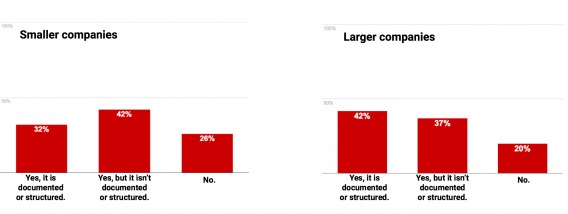
We also found that a large amount of respondents rarely meet with others on their optimization team to discussion CRO. In fact, 26% said they meet “only when necessary.” [Tweet it!]
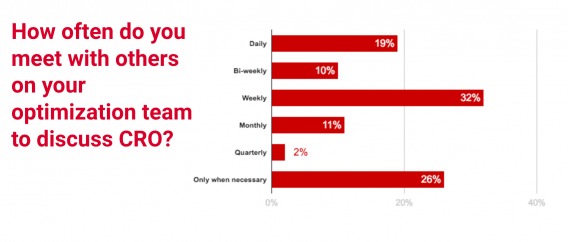
Though, at the other end of that spectrum, 19% meet daily and 32% meet weekly. Regular meetings provide structure and lend credence to the organization taking optimization seriously. As Morgan Brown said at CXL Live, “how would you feel if finance met only when needed?”
Another thing we found is that only 29% of people said that there’s a single dedicated person who does optimization. 30% more said there’s a team in charge of optimization, but 41% of respondents had no one in particular that was accountable for optimization efforts.
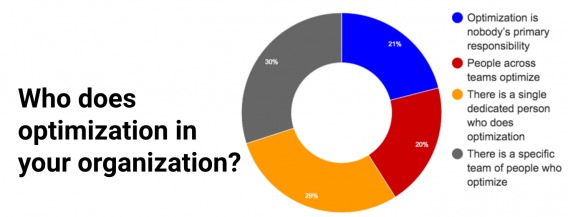
A large part of our respondents (53%) said that there’s no documented budget for CRO in their companies either. [Tweet it!]
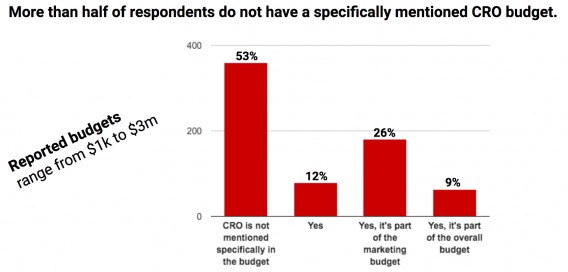
A majority of our respondents run less than 5 tests a month, many of them (43%) only running 1-2 a month. Only a few respondents said they were running 21+ tests a month.
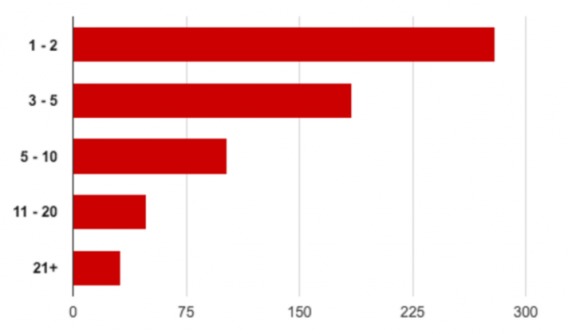
Tracking Organizational Efficiency
How are people tracking their own efforts? If you can’t measure it, you can’t manage it, the saying goes. As data-driven as we are with decisions regarding elements on our sites, sometimes that level of empiricism doesn’t make it to the macro-organizational-level.
For instance, only 48% of respondents said they’re tracking lift per successful experiment, and only 37% said they track their percentage of winning tests.
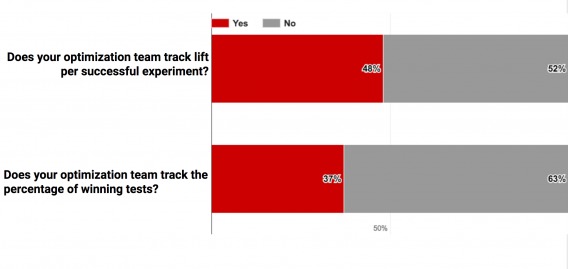
A bit more rigor in that area could do wonders for tracking the effectiveness of a testing program over time.
In good news though, people are communicating results with their teams. Even if most aren’t meeting regularly, 79% of respondents said they share CRO results across their team (though a surprising number of teams don’t have standardized stopping rules for tests):
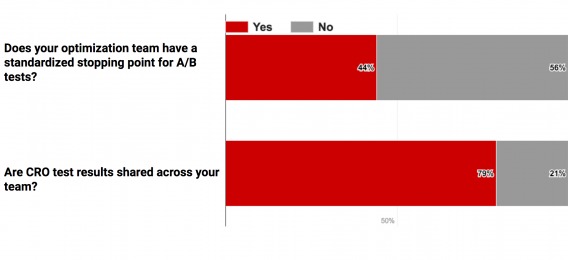
“What to Test” Still an Issue
While a substantial portion of our respondents stated they used data, user testing, or other conversion research methods to uncover testing opportunities, an astonishing amount still look to blog posts for “conversion optimization tactics” for their inspiration.
75% of respondents also said they rely on blog posts to increase their conversion optimization know-how. While that’s flattering if they’re reading CXL’s blog, there’s a lot of bad content out there designed simply to get shares or rank higher on Google. There’s definitely no shortage of these types of posts…

That’s what Peep meant when he said CRO is becoming SEO-ified – and Google results are filled with blogs not written by professional optimizers, but rather bloggers repeating the same ‘best practices’.
While I believe you can learn a ton from data-rich, well-thought-out blog posts, you have to be careful. Think about who’s writing the post, what their agenda is, and how much experience they have optimizing websites.
Hope For the Future of Optimization
Things are looking hopeful for the future, in two ways:
- Budget allocation
- Education
First, budget allocation. 55.5% of respondents say they’ll be increasing the budget this year. Similarly, 68.5% of people will place a higher priority on conversion optimization in 2016 [Tweet it!]
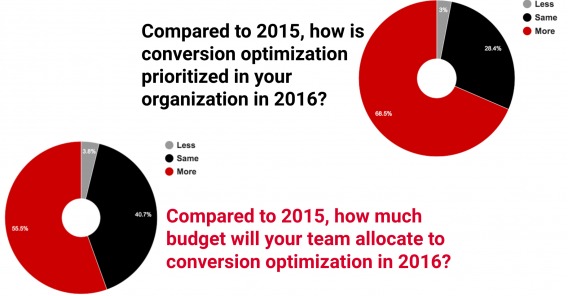
There was also a difference in companies that have a structured process and those that don’t.
Companies who follow a conversion optimization process are increasing their conversion optimization budgets 3% more than companies who don’t follow a conversion optimization process.
Follow a process. You get better results (and more budget from the boss).
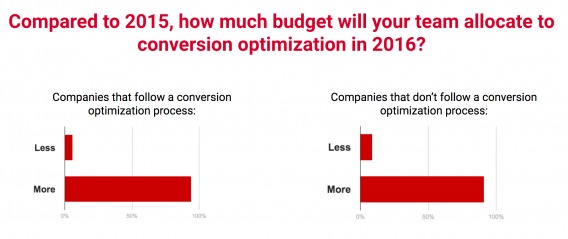
On the education front (pitch time), we have CXL Institute. We’re taking original research and combining it with academic insights, laser-focused mini-courses, and office hours with professional optimizers. Also, we’ll have a forum for optimizers to ask, answer, and discuss CRO things.
Conclusion
Conversion optimization is still a young industry, but it is steadily growing and maturing.
One huge opportunity area is building a structured approach into your optimization team. This means an approach to research and testing, as well as documentation, communication, budget allocation, and assigning someone to be accountable for your testing program within your organization.
Full survey results available here:

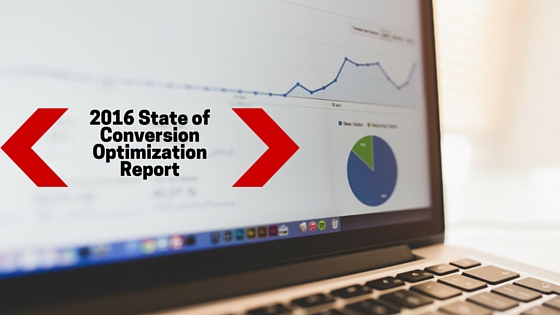
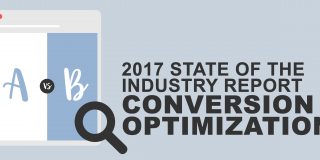


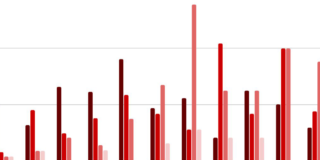
This is epic! Thanks for doing this.
Thank you! Glad you got value out of it.
Very interesting stuff, thanks for doing it.
Thanks!
Hey Alex,
Just curious as to how this survey was conducted and distributed – was it a CXL effort alone?
Hey Natasha – our research team could probably answer more about the makeup of our respondents, but it was largely from our own list.
We also had a few partner CRO-related companies and influencers email it out to their lists, but most completed surveys came from our own audience.
Super awesome! Thanks for sharing this Alex. Downloaded the slide deck for future use.
Thanks! Glad you got value out of it.
I think there is a major knowledge gap when it comes to exactly what this industry DOES.
If you ask 10 people what a CRO is/does you are more than likely going to get 15 answers, as it’s something that is akin to what an SEO used to be.
15 years ago if you knew how to alter Google’s results in your favor, you were a black magic wizard that could demand whatever price, or hold whatever ransom you wanted.
I think this industry is similar to that, what we do can be looked at with wonder and awe, but in reality it’s just basic principles of sociology, psychology and design wrapped up into scientific testing.
Honestly I think this industry should be called social engineering by default, but what do I know.
I think people like Peep need to cement the industry, get the vernacular down and really introduce this as an actual “thing” and not some abstract concepts.
Totally agree – like my point above about meeting new people and the struggle of explaining succinctly “what you do.”
It’s a young industry, though, and the vernacular is tightening up, as well as the processes and strategies associated with optimization.
Thanks for the comment!
-Alex
Thanks Alex! Awesome. Some of the results were surprising for me.
“The average salary of conversion optimizers was $71,340”
So….how do you go about becoming a professional CRO specialist? :)
On a serious note – thank you for sharing! Great stats. Especially useful for marketers that still need to convince their bosses that CRO is a thing.
The best way to start of course is to take my coaching program http://www.peeplaja.com
Awesome! Thank you:)
Thank you for the report, very accurate information. Glad I read this one today. I have been busy converting my Application to a Java Based Script and have not had much time to study digital marketing etc…
I started digging in to CRO when it was first introduced a few years ago, but go side tracked with other obligations needing accomplished. I was curious to the cost analysis. What would the idea budget be as for the amount of cost vs. profit?
Also I noticed that you have shown salary information for CRO. I have been in the business for a while now and I yet have been able to find employment or generated that type of money. Would this be because of some sort of certification or am I missing the big picture?
Great Information.
Hi, Alex!
A worth reading article. really like the way you wrote about the report on conversion optimization. It is very accurate information. Thanks for sharing the great report with us.
Keep doing the good work.
Really really interesting – we’re in the UK and I’m taking this on as a bit of a pet project at the agency I’m at (I currently do SEO) with a view to setting it up as a department in the future.
Would it be fair to say, from your responses, that the UK is behind the US in terms of seeing this as an industry in it’s own right? I notice the salaries are lower and I was wondering if that sort of result correlated with other areas like the budgets, optimisation processes etc?
I’m not sure we can make that conclusion about the UK, because this survey’s results were contingent on the sample that we could pull (largely our own list and a few CRO companies that helped us out). But you do raise interesting points that we’ll try to address with next year’s report. I’d like to see if there are any correlations as well!